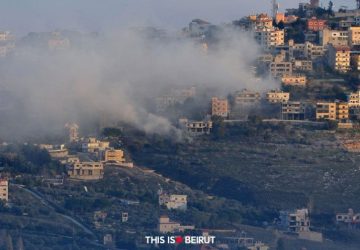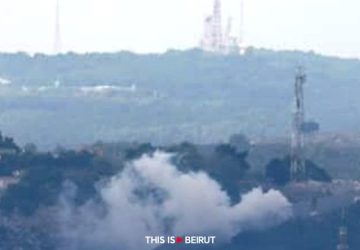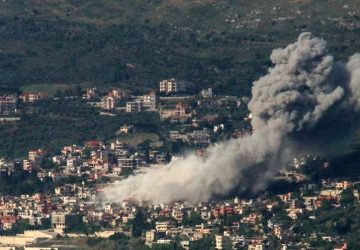Listen to the Article
Has Hezbollah just publicly launched a new political equation: keeping its weapons in exchange for preserving the Taif Agreement? In any case, this is the conclusion drawn by many observers of the remarks made Sunday evening by the Head of the Hezbollah parliamentary bloc, Mohammed Raad, during a speech in southern Lebanon.
“Do not lead us to believe that you want to deviate from your commitments vis-à-vis the Taif Agreement, knowing that whoever does not want resistance, does not want the Taif Agreement,” said Raad, who did not hesitate to add, “So be careful where you are leading the country.”
Even though most of the speech was devoted to attacks on Hezbollah critics, accusing them of resorting to “incitement and hatred following the regrettable incident in Kahaleh,” Raad’s menacing tone and the equation “resistance-Taif” raised eyebrows among observers.
We recall that, following the overturning on Wednesday evening in Kahaleh of a truck belonging to the pro-Iranian formation and carrying ammunition, a shootout broke out between local residents and elements of Hezbollah, killing a resident of Kahaleh and the driver of the truck.
Analysts have also established a link between this “equation” and the “shows of force” regularly carried out by Hassan Nasrallah’s party in several Lebanese regions.
Souhaid: Taif-Weapons Contradiction
For Fares Souhaid, president of the National Council against the Iranian occupation, the words of Mohammed Raad are clear, “He presented a political equation, where the Taif Agreement faces the weapons of Hezbollah. He is threatening us by saying: if you touch the weapons of Hezbollah, I will touch Taif.”
However, he states that Raad “knows very well that the Taif Agreement does not authorize the presence of illegal weapons, outside the framework of the Lebanese State, or weapons that fall under a supranational political decision or a regional decision, moreover that of Iran.” This is why “there is contradiction and not homogeneity between Taif and the weapons of Hezbollah,” Souhaid insists.
Hamadeh: Denial of Taif
Marwan Hamadeh, Democratic Gathering MP, expresses the same opinion. To the equation “weapons against Taif,” he snaps back, “Weapons are against Taif.”
Hamadeh explains, “They are a total denial of the Taif Agreement, which stipulates the disarmament of the militias. A reprieve had been granted to Hezbollah, unofficially, as part of the efforts to obtain the Israeli withdrawal. And since the year 2000, these weapons are totally illegal.”
In this context, Hamadeh recalls that “Taif also stipulated the withdrawal of foreign forces, and called for what were then named ‘privileged’ relations with Syria.” He notes, “What remains of all this are illegal weapons, a foreign occupation, and relations with Syria which amount to one and a half million refugees driven out by the violence of the Syrian regime.”
Kassir: Commitment to Taif
On the other hand, Kassem Kassir, a political analyst who closely follows the Hezbollah file, believes that Mohammed Raad’s remarks do not constitute a threat to modify Taif in any way. According to him, the leader of the Hezbollah bloc “stresses the importance of resistance against the Israeli enemy, and recalls that the Taif Agreement mentions it.”
“In fact, Hezbollah reiterates its commitment to Taif and asks for its application,” he says.
“New Constitution”
Kassir’s opinion is not shared by everyone. Many observers are convinced that Raad’s remarks pose a thinly veiled threat.
If so, what is Hezbollah actually asking for?
“When we talk about weapons outside the framework of Taif, the Constitution and international resolutions, we slip on their ground. March 14 could not pursue its path because it did not remain attached to the reference texts. There can be no defense strategy outside the framework of the application of resolution 1701,” says Souhaid, former secretary general of the March 14 Movement.
Hezbollah wants “a new Constitution based on a new balance of forces that Iran considers to be in its favor in Lebanon, Syria and Iraq, knowing that Tehran is also trying to control the Palestinian card,” Souaid underlines.
According to him, Hezbollah believes that “it is now or never the time to try to obtain benefits in Lebanon, which it did not acquire when Taif was signed in 1989, because its role, and that of its community in Lebanon, are more important today.”
Legalization of Weapons
For Hamadeh, the demand resulting from such an equation would be the following, “Legalizing the weapons ad vitam æternam. Making the legalization of the weapons of the so-called resistance an integral part of the Lebanese Constitution.”
However, he underlines, “this could only lead to a disarticulation of Lebanon, an internal explosion and an eventual division which will be the worst possible scenario.”
Would this equation pave the way, as some analysts fear, for a change in the system, under which the Islamic-Christian parity at the level of power would be replaced by a distribution by thirds (Christian-Sunni-Shiite)?
For Hamadeh, “the fact that arms have supremacy removes all meaning from the distribution of powers, from inter-community balances, and from the ‘living together’ provided for in the preamble to the Constitution. The weapons keep the final word. This would give free rein to all possible and imaginable fantasies, in a country which has experienced too many setbacks for three centuries.”
If such an equation were to be formalized, should the Lebanese agree to maintain the weapons to preserve the Taif Agreement?
“No, if we keep the weapons, we abolish Taif,” replies Hamadeh without hesitation.
For his part, Souhaid notes that the “presidential haggling” underway between the leader of the Free Patriotic Movement, Gebran Bassil, and Hezbollah “closely resembles” this equation. “He is telling them: give us administrative decentralization and take all the national decisions,” adds Souhaid.
The Importance of Taif
Hamadeh stresses the importance of preserving this agreement, signed on October 22, 1989, which ended the Lebanese civil war. “Taif regulates Lebanese political life through a Constitution which is still valid and which can only be modified by the representatives of the Lebanese people in the Chamber,” explains the Chouf MP. He insists that this agreement makes it possible “not to leave the way open to an internal explosion.”
Souhaid notes that “despite all that is said about a new Constitution or a federal Lebanon, the Taif Agreement remains, for the majority of the Lebanese, the lifeline for organizing Lebanese-Lebanese relations.”
He also emphasizes “the international community’s unconditional support for this agreement.” In this context, he recalls that the United States, France and Saudi Arabia published a joint statement on September 21, 2022 calling for the election of a President of the Republic and the formation of a government that can take charge of the application of the Lebanese Constitution, the Taif Agreement and United Nation resolutions 1559, 1680, 1701 and 2650.
Souhaid adds that the same call, which insists in particular on respecting the Taif Agreement, was launched by the Group of Five (USA, France, Saudi Arabia, Egypt and Qatar) which met in Doha.
Complementarity of Legalities
The former Jbeil MP notes that “the legal basis of resolutions 1559, 1680 and 1701 is the Taif Agreement,” stressing that “there is a complementarity between Lebanese legality and international legality, which cannot be dissociated.” Hence, he believes that Hezbollah “is weakening Taif, internally, to then weaken international resolutions.”
For Souhaid, Raad “has proven right all those who advocate that opposition to Hezbollah weapons and Iranian control over the country must have reference texts, and the Taif Agreement is one of these essential texts, with the Lebanese Constitution and the UN resolutions.”
“Even those who consider Taif to be obsolete must support it today. It is a national priority. And Mohammed Raad has proven us right,” he concludes.





